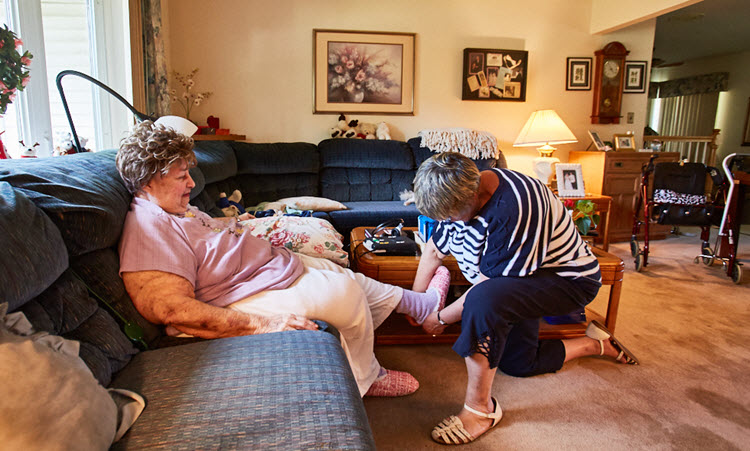“Caregiving is hard, even on the good days when it brings happiness. It requires commitment, dedication, determination and time.” First Lady Rosalynn Carter
As someone who has been a family caregiver for seven years, there has been a marked increase this last year in the number of hours mom needs hands-on care and that is on top of keeping her safe in the middle of a pandemic. I know this increase in caregiving duties has increased my stress, but I didn’t realize how on edge I am during mom weekends until I came home on a Saturday instead of my normal Sunday. The ability to have Sunday to decompress before jumping into the work week was huge.
Caregiving IS hard, even on the good days, which is why I’m glad this Friday, February 19, 2021 is designated as National Caregivers Day. I believe every opportunity to lift up family and professional caregivers is important. We are a silent majority that too often goes unrecognized by business owners and policy makers. More importantly, we often go unrecognized by our family, friends and the person for whom we care.
Over the last seven years, I have learned to ask for and say yes to help and to set boundaries. But the weekends I am with mom, there are certain must-do personal tasks which are my responsibility. Unfortunately, not every caregiver responsibility allows you to set a boundary or provides an opportunity to ask for help. So you ask, what can you do to support me? You can validate what I do with a simple thank you.
When you say the words thank you to a caregiver, we know our commitment and compassion is recognized and that you see our sacrifices. It is the most powerful way you can acknowledge our value as caregivers. Currently, monetary compensation is the only way our culture assigns value to work. I hope some day family caregivers will be compensated with money. Until then, a thank you will do.
If you don’t feel comfortable saying these words face-to-face, a card or letter with a sincere hand-written note is something that can be a caregiver’s touchstone on difficult days. Your message doesn’t have to be long or profound. It can a simple “Thank you for everything you do as XXXX’s caregiver.” This validates our hard work and lets us know you appreciate everything we do as a caregiver.
Has anyone ever said to you “I don’t need to tell you I love you, you know I do.” I have never understood this sentiment. I feel the same way about thank you. I can’t read your mind. The words need to be expressed in some way because words matter; they have power, meaning and weight.
I realized how important these words are to me after being mom’s caregiver for several months. I was so resentful of everything I was doing for her because I did not feel appreciated. It was time to have an intentional conversation. “Mom, I’m feeling frustrated and unappreciated as your caregiver. It seems like you expect me to carry out caregiving tasks, because you rarely express gratitude for what I do. know you appreciate all that I do for you, but sometimes I need to hear the words “thank you.”
This was a turning point in our relationship. Since that conversation, Mom thanks me for helping her get dressed, take her blood sugar, get her a drink or a thousand other daily caregiving tasks. In turn, I feel appreciated and I don’t undervalue those words by saying “Oh it’s nothing” or “Oh it’s my job.” I say “You’re welcome.”
Disclaimer: The material in this blog is for educational purposes only. It is not intended to replace, nor does it replace, consulting with a physician, lawyer, accountant, financial planner or other qualified professional.
Deb is available as a caregiver consultant. She will answer the question: “Where do I start?” and find the resources to alleviate your stress. If you would like to invest a half hour to learn how she can help you, please contact her at: Free 30 minute consulting call
Deb is the author of “Your Caregiver Relationship Contract.” This book explains how to have an intentional conversation and the how unspoken expectations can cause problems. Click here to learn more about Your Caregiver Relationship Contract.

